A member of the Israelites of the New Universal Pact religious group, holds out her right arm to maintain her balance as she walks through a market on the muddy banks of the Amazon River, in Alto Monte de Israel, Peru, Sunday, March 28, 2021. The political arm of the messianic group, the Agricultural People's Front of Peru, known as Frepap, has emerged as a potential favorite in Sunday's April 11th legislative elections. (AP Photo/Rodrigo Abd)
The Associated Press
JOSE CARLOS MARIATEGUI, Peru (AP) - On the banks of the Amazon River, in a village without electricity or drinking water, Andrea Rodrigo makes the yuca flour that her family sells in markets along Peru's remote borders with Brazil and Colombia.
The 21-year-old Peruvian woman and seven of her neighbors recently paddled for half an hour down the vast river to two Indigenous communities where they put up posters for their political party, the Agricultural People's Front of Peru.
Known as Frepap, it is the political arm of a messianic religious group called the Israelites of the New Universal Pact, which merges Old Testament Christianity with Andean culture. Adherents believe their leader, Jonás Ataucusi Molina, is the reincarnation of Jesus Christ and the Amazon is the promised land or the 'œland without evil,'ť leading the faithful to populate remote forests bordering Brazil, Colombia, Ecuador and Bolivia.
Amid widespread disgust with traditional politicians and an extremely fragmented electorate, Frepap has emerged as a potential favorite in legislative elections Sunday, when Peruvians will also cast ballots for president. Observers say its surprising growth as a political force has to do with the roots it has put down and the proselytizing it has done in remote communities and poor neighborhoods, as well as weariness with seemingly endless corruption scandals among the establishment parties.
All of Peru's former presidents since 1985 have been accused of corruption, with some imprisoned or arrested in their mansions and one taking his own life before police could capture him. Despite being prosecuted, one is currently running for president and another is seeking a seat in parliament. In the last 12 years, 57 former governors and 2,002 ex-mayors have been prosecuted or are fugitives. An official audit in 2019 found that corruption was consuming $17 million a day in Peru, enough to feed the country's poor.
'œI would like to see more members of Congress from Frepap, teaching people not to steal,'ť Rodrigo said as she adjusted her hair covering. Hanging on the wall of her hut was a painting of a blue fish, the symbol of the party created in 1989 by the late shoemaker Ezequiel Ataucusi Gamonal, founder of the religious movement and father of its current leader.
In a January 2020 special election called after President Martin Vizcarra dissolved congress, Frepap stunned prognosticators by winning 15 of 130 seats to become the third largest bloc in the country's fragmented legislature.
In the year since, Frepap has maintained its image as 'œseparated from the scandals '¦ and without attitudes that reflect religious fanaticism or radical conservatism,'ť said anthropologist Carlos Ráez, who has studied the party.
Polls suggest no single party may win even 10% of the legislative vote Sunday, and analysts say Frepap's clean image and backing in distant or impoverished communities far away from media and pollsters could produce another electoral surprise. Almost one third of voters are undecided.
Frepap candidates appeal to voters with promises to fight for agricultural development, oppose corruption and defend the rights of the poor. They are staunch religious conservatives, opposing abortion and same-sex marriage.
On a recent day, Milca Copa, a teacher in a town near Rodrigo's village, was one of three Frepap candidates who crossed the Amazon with a message for voters: She was one of them.
'œI have walked in the mud, I have lived without water, without electricity, without internet,'ť Copa told supporters.
'œFrepap does not come one day and leave," she added, to applause and chants. "We live here.'ť
For more than 30 years, Israelite communities have popped up in the Amazon as the faithful migrated there from the Andes or desert areas along the Pacific, obeying their founder's call to populate the rainforest. Many of the faithful live in Mariscal Ramon Castilla province, a forested area larger than Belgium and divided by the Amazon River near Colombia and Brazil.
The first people to join the Israelites of the New Universal Pact were poor Andean migrants, sometimes sick or orphaned, who had no contacts in the cities, experts say.
'œThey were drawn to the movement because it offered them a way to survive in communities, in agriculture,'ť said Juan Ossio, a professor of anthropology at Peru's Pontifical Catholic University who has written a book about the Israelites.
Frepap's political opponents say its members are united but also impenetrable, and express concerns about the messianic group's rise on the political stage.
'œThey are very hard-working, very united, but very closed,'ť said Julio Tuesta, the Popular Action party mayor of San Jose de Cochiquinas, a village on the banks of the Amazon. 'œWhat makes me doubtful is that they mix religion and politics. What will it be like when they have more power?'ť
But Pablo Rodrigo, Andrea's father, said the group's political gains have won their people respect.
In the hamlet of Jose Carlos Mariategui, he and his neighbors grow rice, lettuce, coriander, tomatoes, cucumbers, pineapples, papayas and yucas. Several months ago he bought an electrical generator and a computer to draft community agreements.
'œGod says if you work, you will be flooded with bread," Pablo Rodrigo said. "But if you are idle, you will be poor.'ť
It's a humble but honorable life, he added: 'œWe don't drink, we don't smoke, we live in peace.'ť
___
Associated Press religion coverage receives support from the Lilly Endowment through The Conversation U.S. The AP is solely responsible for this content.
Andrea Rodrigo, a member of the Israelites of the New Universal Pact religious group, removes the husk from a yucca or cassava root, on the banks of the Amazon River in Jose Carlos Mariategui, Peru, Wednesday, March 31, 2021. The 21-year-old Peruvian woman makes yucca flour that her family sells in markets along Peru's remote borders with Brazil and Colombia. (AP Photo/Rodrigo Abd)
The Associated Press
Supporters of the Agricultural People's Front of Peru political party, known by its acronym Frepap, take part in an election campaign caravan in San Pablo, Peru, Tuesday, March 30, 2021. Frepap is the political arm of a messianic religious group called the Israelites of the New Universal Pact, which merges Old Testament Christianity with Andean culture. (AP Photo/Rodrigo Abd)
The Associated Press
Asunta Salazar and her husband Mariano Torres, who are members of Israelites of the New Universal Pact religious group, guide a mule through a lakelet as they head home after harvesting bananas from their farmland, near San Pablo, Peru, Monday, March 29, 2021. For more than 30 years, Israelite communities have popped up in remote Amazon forests as the faithful have migrated there from the Andes Mountains or from desert neighborhoods on Peru's Pacific coast. (AP Photo/Rodrigo Abd)
The Associated Press
Leonidas La Torre reads passages from the Bible while sitting next to his son Daniel, inside their home in Alto Monte de Israel, Peru, Saturday, March 27, 2021. Father and son are members of a messianic religious group called the Israelites of the New Universal Pact, which merges Old Testament Christianity with Andean culture. (AP Photo/Rodrigo Abd)
The Associated Press
A man braves a rain shower as he walks barefooted on a muddy road to sell his chickens at the weekend market, in Alto Monte de Israel, Peru, Sunday, March 28, 2021. Peruvians head to the polls on Sunday, April 11, to choose a president from a field of 18 candidates following years of political turmoil that have seen a series of presidents and even the whole congress itself ousted over corruption scandals. (AP Photo/Rodrigo Abd)
The Associated Press
Gildomero Gomez, a member of the Israelites of the New Universal Pact religious group, performs a healing ceremony on Raul Alejos who is infected with the new coronavirus, in San Pablo, Peru, Monday, March 29, 2021. The group believes its leader, Jonás Ataucusi Molina, is the reincarnation of Jesus Christ and the Amazon is the promised land or the "land without evil," leading its faithful to populate remote forests bordering Brazil, Colombia, Ecuador and Bolivia. (AP Photo/Rodrigo Abd)
The Associated Press
Gildomero Gomez, a member of the Israelites of the New Universal Pact religious group, reads from the Bible during a healing ceremony for a fellow member suffering from COVID-19, in San Pablo, Peru, Monday, March 29, 2021. The country is among those hardest hit by the virus, with more than 1.5 million confirmed cases and over 53,400 deaths. (AP Photo/Rodrigo Abd)
The Associated Press
Julian Ordonez, front, and Miguel Ticopa, members of the Israelites of the New Universal Pact religious group, navigate the Amazon River to return to their home in Jose Carlos Mariategui, Peru, Wednesday, March 31, 2021, after a day of farming their land. Peruvians head to the polls on Sunday, April 11, to choose a president from a field of 18 candidates following years of political turmoil that have seen a series of presidents and even the whole congress itself ousted over corruption scandals. (AP Photo/Rodrigo Abd)
The Associated Press
Milfa Mamani Escobar, a member of the Israelites of the New Universal Pact religious group, carries an armful of papayas harvested from her farm, in Jose Carlos Mariategui, Peru, Wednesday, March 31, 2021. The first people to join the messianic religious group more than 30 years ago were poor Andean migrants, sometimes sick or orphaned, who had no contacts in the cities, experts say. (AP Photo/Rodrigo Abd)
The Associated Press
Supporters of the Agricultural People's Front of Peru party, the political arm of a messianic religious group called the Israelites of the New Universal Pact, pose for selfies after filming a political ad, in Iquitos, Peru, Sunday, March 21, 2021. Frepap has emerged as a potential favorite in the upcoming April 11 legislative elections amid widespread disgust with Peru's traditional politicians and an extremely fragmented electorate. (AP Photo/Rodrigo Abd)
The Associated Press
A pet bird perches on the head of Pablo Rodrigo, a member of the Israelites of the New Universal Pact religious group, as he says a prayer over the morning meal, in his home in Jose Carlos Mariategui, Peru, Thursday, April 1, 2021. Rodrigo says now that the Israelites are in politics, people respect them. But before that "because of our hair and beards, people said we had lice and other atrocities." "We don't drink, we don't smoke, we live in peace," said the farmer. (AP Photo/Rodrigo Abd)
The Associated Press
Young female members of the Israelites of the New Universal Pact religious group, push an overloaded motorbike taxi up a hill during an Agricultural People's Front of Peru or Frepap campaign rally, in San Pablo, Peru, Tuesday, March 30, 2021. Analysts say Frepap's clean image and backing in distant or impoverished communities far away from media and pollsters could produce an April 11 electoral surprise. (AP Photo/Rodrigo Abd)
The Associated Press
Commuters travel on a ferry on the Amazon River towards Jose Carlos Mariategui, Peru, Wednesday, March 31, 2021. Peruvians head to the polls on Sunday, April 11, to choose a president from a field of 18 candidates following years of political turmoil that have seen a series of presidents and even the whole congress itself ousted over corruption scandals. (AP Photo/Rodrigo Abd)
The Associated Press
Agricultural People's Front of Peru congressional candidates greet supporters as they are driven past a statue of Cuban revolutionary hero Ernesto "Che" Guevara, in San Pablo, Peru, Tuesday, March 30, 2021. Known by its acronym, Frepap is the political arm of a messianic religious group called the Israelites of the New Universal Pact, which merges Old Testament Christianity with Andean culture. (AP Photo/Rodrigo Abd)
The Associated Press
Congressional candidate Arturo Pereyra, of the Agricultural People's Front of Peru or Frepap, greets supporters accompanied by a person dressed as the party's symbol, a blue fish, in San Pablo, Peru, Tuesday, March 30, 2021. In a Jan. 26, 2020 special election to choose lawmakers, Frepap, the political arm of the Israelites of the New Universal Pact religious group, came from nowhere to stun prognosticators by winning 15 seats in the 130-seat legislature to become the third largest bloc. (AP Photo/Rodrigo Abd)
The Associated Press
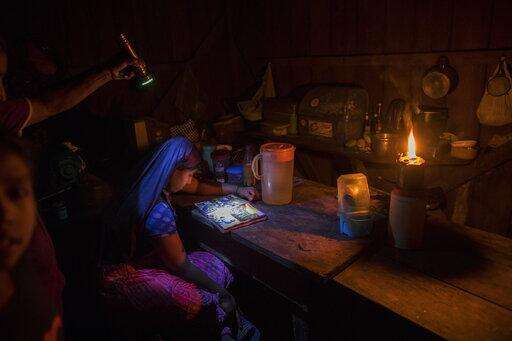
With the aid of a flashlight and kerosene flame, 12-year-old Zairi Olivia, a member of the Israelites of the New Universal Pact religious group, looks at The Children's Illustrated Bible, inside her house in Jose Carlos Mariategui, Peru, Wednesday, March 31, 2021. For more than 30 years, Israelite communities have popped up in remote Amazon forests as the faithful have migrated there from the Andes Mountains or from desert neighborhoods on Peru's Pacific coast, obeying their late leader's call to populate the rainforest region. (AP Photo/Rodrigo Abd)
The Associated Press
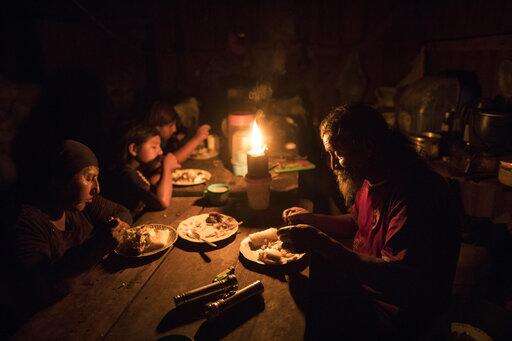
The Ordonez family, members of the Israelites of the New Universal Pact religious group, eat dinner illuminated by a kerosene flame in Jose Carlos Mariategui, Peru, Wednesday, March 31, 2021. The group believes its leader, Jonas Ataucusi Molina, is the reincarnation of Jesus Christ and the Amazon is the promised land or the "land without evil," leading its faithful to populate remote forests bordering Brazil, Colombia, Ecuador and Bolivia. (AP Photo/Rodrigo Abd)
The Associated Press
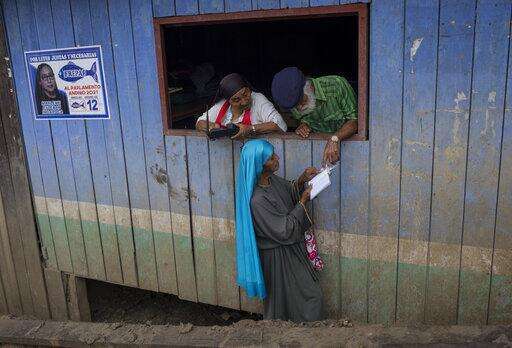
An election poster promoting a congressional candidate from the Agricultural People's Front of Peru political party is displayed on a store front as a customer shows the owner, who rents out telephone services, the number she would like his wife to dial, in the Israelites of the New Universal Pact religious community of Alto Monte de Israel, Peru, Sunday, March 28, 2021. The party, known as Frepap, has emerged as a potential favorite in Sunday's legislative elections amid widespread disgust with Peru's traditional politicians and an extremely fragmented electorate. Â (AP Photo/Rodrigo Abd)
The Associated Press
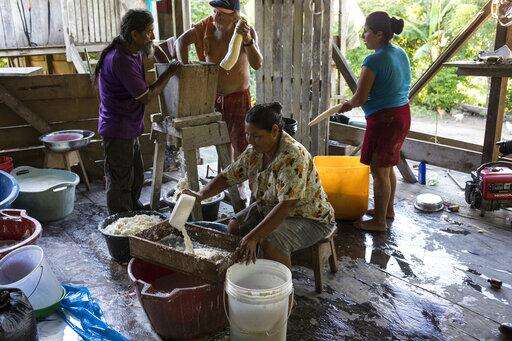
Pablo Rodrigo, second left, and some family members, who belong to the messianic religious group called the Israelites of the New Universal Pact, make yucca or cassava root flour for selling, on their land in Jose Carlos Mariategui, Peru, Wednesday, March 31, 2021. "God says if you work, you will be flooded with bread. But if you are idle, you will be poor," said the farmer who several months ago bought an electricity generator and a computer to write his community's agreements. (AP Photo/Rodrigo Abd)
The Associated Press
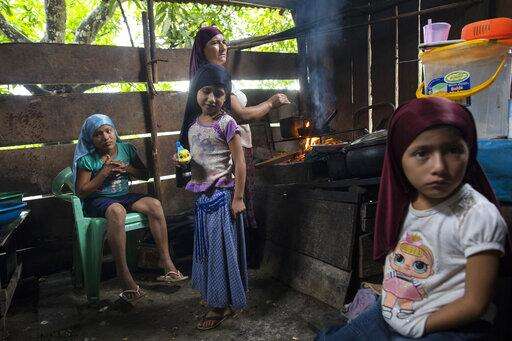
Rosa Torres, a member of the Israelites of the New Universal Pact, cooks breakfast for her three daughters in their home in San Pablo, Peru, early Monday morning, March 29, 2021. The first people to join the religious group were poor Andean migrants, sometimes sick or orphaned, who had no contacts in the cities, experts say. Â "They were drawn to the movement because it offered them a way to survive in communities, in agriculture," said Juan Ossio, professor of anthropology. (AP Photo/Rodrigo Abd)
The Associated Press
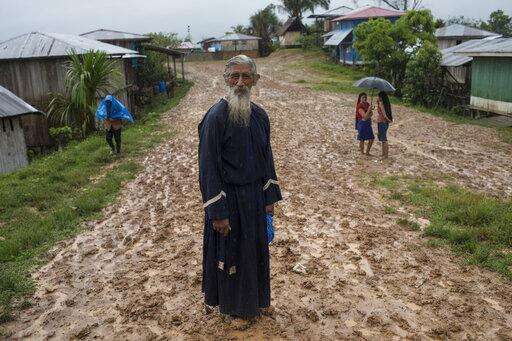
A member of the Israelites of the New Universal Pact religious group poses for a photo after a heavy rain in Alto Monte de Israel, Peru, Sunday, March 28, 2021. The group believes the Amazon is the promised land or the "land without evil." Â Experts say the surprise emergence of its party, the Agricultural People's Front of Peru known as Frepap, as a political force has to do with the roots it has sown and the proselytizing it has done in remote communities and poor neighborhoods. (AP Photo/Rodrigo Abd)
The Associated Press